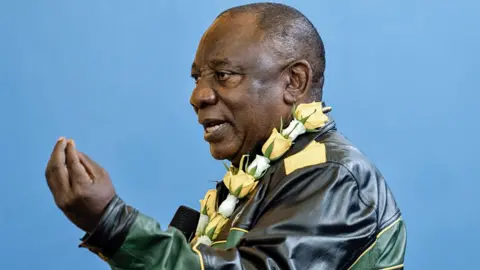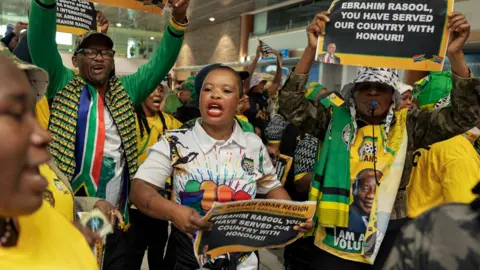Can Mandela's former negotiator charm Donald Trump?
 AFP/Getty Images
AFP/Getty ImagesSouth Africa's president has faced tough challenges before - he was the chief negotiator for Nelson Mandela's African National Congress (ANC) during talks to end white-minority rule in the early 1990s - but his forthcoming meeting in the White House will require all his charm.
Cyril Ramaphosa wants to mend his nation's fractured relationship with the US - and his famous negotiating skills will be put to the test as he tries to win over the world's most powerful leader.
US President Donald Trump and his team have been uncharacteristically quiet about the trip, with White House Press Secretary Karoline Leavitt declining on Monday to provide any details - or even publicly acknowledge that the visit is taking place.
"The trade relations are what's most important — that's what has brought us here," Ramaphosa said in Washington on Tuesday. "We want to come out of the United States with a really good trade deal. We want to strengthen those relations and we want to consolidate good relations between our two countries."
The two have been at loggerheads for months, with Trump repeatedly insisting that South Africa's Afrikaner community is facing a "genocide" - a claim amplified by his close adviser Elon Musk, the South African-born tech billionaire.
Tensions ramped up days after Trump took office for his second term in January when President Ramaphosa signed into law a controversial bill allowing South Africa's government to expropriate privately owned land without compensation in certain circumstances, when it is deemed "equitable and in the public interest".
This only served to tarnish the image of Africa's biggest economy in the eyes of the Trump administration - already angered by its genocide case against Israel at the International Court of Justice (ICJ).
In February, the US president announced the suspension of critical aid to South Africa and offered to help members from the Afrikaner community, who are mostly white descendants of early Dutch and French settlers, to settle in the US as "refugees".
 AFP/Getty Images
AFP/Getty ImagesSouth Africa's ambassador to Washington, Ebrahim Rasool, was also expelled in March after accusing Trump of "mobilising a supremacism" and trying to "project white victimhood as a dog whistle".
US Secretary of State Marco Rubio said Rasool was a "race-baiting politician" who was "no longer welcome in our great country".
The arrival of the first group of Afrikaners in the US last week further inflamed the situation, with Trump again doubling down on his claims that white farmers were being "brutally killed" and their "land is being confiscated" - which has been repeatedly denied by the South Africa government.
According to South African political analyst Anthoni van Nieuwkerk, Ramaphosa's decision to go the White House is a "high-risk strategy", especially given Trump's recent hard-line stance.
Ramaphosa's spokesperson, Vincent Magwenya, told the BBC it was hoped the trip would "set in motion a process towards the normalisation of diplomatic relations" and "lay the foundation" for improved trade relations.
Given that it had all been confirmed at short notice, the South African delegation - which includes four senior cabinet ministers - had had little time to set up a "formal programme", he said.
But he suggested it was likely to focus on extending the African Growth and Opportunity Act (Agoa), a 25-year-old piece of US legislation guaranteeing duty-free access to American consumers for certain goods from Africa.
South Africa is one of the largest exporters under Agoa, generating about $2.7bn (£2bn) in revenue in 2023, mostly from the sale of vehicles, jewellery and metals.
There is concern the deal may not be renewed when it comes up for review later this year or that if it is, South Africa may be excluded from the new agreement.
"In the absence of that continuation or extension of Agoa, we are ready to engage with the Trump administration over a new trade relationship framework that we believe will be mutually beneficial," Mr Magwenya said.
On the souring of relations between Pretoria and Washington, he said South Africa hoped to have a "frank, constructive discussion about them".
Interestingly Agricultural Minister John Steenhuisen is part of the delegation. His Democratic Alliance political party is part of South Africa's coalition government and has been a vocal critic of the ANC's empowerment policies, saying they lead to cronyism and corruption. The ANC denies this.
Speaking of the ICJ case, in which South Africa accused Israel in December 2023 of committing genocide against Palestinians living in Gaza - an allegation Israel denies, Mr Magwenya admitted it might "lead to a robust discussion".
"Procedurally, we can't withdraw that issue [and it] will remain in contention.
"However, with respect to the humanitarian crisis and its alleviation - there's agreement there with President Trump and we will focus more on what we can do together on those areas where we agree."
On Friday, Trump acknowledged "a lot of people are starving" in Gaza following Israel's recent blockade of humanitarian supplies to the territory - comments that have led to a "basic amount of food" entering Gaza.
Prof Van Nieuwkerk predicts two likely scenarios playing out - the first sees "pleasant and cordial" interaction and the reset that South Africa is keen on "if rational minds prevail and if a lot of homework has been done" on both sides.
But he warns should "emotional minds prevail" and the focus be on white genocide claims, things could unravel quickly.
"If the South African delegation cannot convince the Trump administration of the right of South Africa to exercise its own policy choices domestically and internationally… then the Oval Office moment will be used by Trump to humiliate Ramaphosa and to read him the riot act," the University of South Africa academic said.
"That second scenario is not what we want."
He hopes that South Africa's delegation has arrived in the US with an "enticing proposal", adding: "The negotiations cannot start in the Oval Office, in front of the cameras. That live moment must be the conclusion of a negotiation that should have happened earlier."
On this score, he says South Africa does have an ace up its sleeve: Ramaphosa, known for his negotiating skills and warmth.
He knows what buttons to press - and finding common ground over golf could be the swing he takes - the 72-year-old has already invited the US leader for a friendly round of golf during the G20 Summit taking place in South Africa in November.
"Whether people like Cyril Ramaphosa or not, we have to acknowledge that he was one of the key players in the transition from apartheid to democracy. He made it happen because of his personality and style," Prof Van Nieuwkerk said.
Dr Lubna Nadvi, a political analyst based at South Africa's University of KwaZulu-Natal, agrees the South African president has the personality to "handle the situation should things get out of hand".
"I anticipate that this face-to-face meeting will allow for the relationship to be strengthened, for facts to be placed on the table," she said, adding that the "propaganda" that had influenced Trump would have to be tackled.
It was important for Ramaphosa's team to get the US to "accept that South Africa is a sovereign country and is entitled to take the decisions it wants to take", Dr Nadvi said.
Mr Magwenya also made the point that South Africa would not be heading into Wednesday's meeting "with a begging bowl".
"As much as South Africa needs access to one of the world's largest markets... the United States equally needs certain products and goods out of South Africa."
South Africa currently exports a variety of minerals to the US, including platinum, iron and manganese, as well as precious stones, metals and fruit.
Its "geo-strategic location" also made it "attractive" to the US, Prof Van Nieuwkerk added.
Painting a worst-case scenario, the analyst said: "There are players who would like to see us fail and then step in and... displace our role in Africa. This is the price we will pay if it goes wrong in the Oval Office".
But Mr Magwenya was at pains to explain the White House meeting was not a "sprint" to a solution.
"What it represents is the beginning of a process towards resolving the current impasse and normalising diplomatic relations," he said.
"Whether that meeting has a negative or positive outcome, it will be nonetheless a major opportunity for us to begin towards normalising the relationship."
Additional reporting by the BBC's Bernd Debusmann Jr in Washington DC.
More on South African-US relations:
- Is there a genocide of white South Africans as Trump claims?
- Is it checkmate for South Africa after Trump threats?
- Do Afrikaners want to take Trump up on his South African refugee offer?
- Racially charged row between Musk and South Africa over Starlink
- South Africa and Ukraine woo each other - as relationships with Trump turn sour
 Getty Images/BBC
Getty Images/BBCGo to BBCAfrica.com for more news from the African continent.
Follow us on Twitter @BBCAfrica, on Facebook at BBC Africa or on Instagram at bbcafrica
